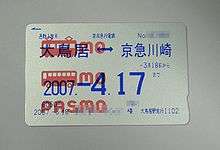Pasmo


Pasmo (パスモ Pasumo) is a rechargeable contactless smart card ticketing system for public transport introduced in Tokyo, Japan, on March 18, 2007.
Pasmo is a development of the Passnet system used by many non JR railway lines in the Tokyo region. The system offers interoperability with the JR East Suica system, as well as integrating private bus companies into the former Passnet network.
The technology is based on RFID technology developed by Sony corporation known as FeliCa. Pasmo is available as a credit-card-sized card.
As of April 2009, over 11 million cards are in circulation.[1]
Companies and organizations accepting Pasmo
Railways
Most railway operators introduced the system simultaneously when Pasmo started.
- Chiba Urban Monorail (from 14 March 2009)
- Enoshima Electric Railway (Enoden)
- Hakone Tozan Railway
- Hokuso Railway
- Izu Hakone Railway (Daiyuzan Line only)
- Keikyu
- Keio Corporation
- Keisei Electric Railway
- Metropolitan Intercity Railway Company (Tsukuba Express)
- Nippori-Toneri Liner
- Odakyu Electric Railway
- Sagami Railway (Sōtetsu)
- Saitama Railway
- Seibu Railway
- Shin-Keisei Electric Railway
- Tama Toshi Monorail
- Tobu Railway
- Tokyu Corporation
- Tokyo Metro
- Tokyo Metropolitan Bureau of Transportation (Toei Subway)
- Toyo Rapid Railway
- Yokohama City Transportation Bureau (Yokohama Subway)
- Yokohama Minatomirai Railway Company
- Yokohama New Transit (Kanazawa Seaside Line)
- Yurikamome
Buses and tramways
Bus and tramway operators have been introducing Pasmo readers on their systems gradually.
- Chiba Kotsu
- Enoshima Electric Railway
- Enoden Bus
- Fuji Kyuko
- Fuji Express
- Fujikyu City Bus
- Fujikyu Heiwa Kanko
- Fujikyu Shizuoka Bus
- Fujikyu Shonan Bus
- Fujikyu Yamanashi Bus
- Funabashi Shin-Keisei Bus
- Matsudo Shin-Keisei Bus
- Narashino Shin-Keisei Bus
- Hakone Tozan Bus
- Odakyu Hakone Highway Bus
- Heiwa Kotsu
- Danchi Kotsu
- Hitachi Jidosha Kotsu
- Izu Hakone Railway
- Kanagawa Chuo Kotsu
- Fujisawa Kanako Bus
- Sagami Kanako Bus
- Shonan Kanako Bus
- Tsukui Kanako Bus
- Yokohama Kanako Bus
- Kanto Bus
- KB Bus
- Kawasaki City Transportation Bureau (Kawasaki City Bus)
- Kawasaki Tsurumi Rinko Bus
- Rinko Green Bus
- Keihin Kyuko Bus
- Haneda Keikyu Bus
- Shonan Keikyu Bus
- Yokohama Keikyu Bus
- Keio Bus
- Keio Bus Chūō
- Keio Bus Higashi
- Keio Bus Koganei
- Keio Bus Minami
- Keio Dentetsu Bus
- Keisei Bus
- Chiba Chuo Bus
- Chiba City Bus
- Chiba Flower Bus
- Chiba Green Bus
- Chiba Kaihin Kotsu
- Chiba Nairiku Bus
- Chiba Rainbow Bus
- Ichikawa Kotsu Jidosha (Ichikawa Line Bus)
- Keisei Town Bus
- Keisei Transit Bus
- Tokyo Baycity Kotsu
- Kokusai Kogyo Bus
- Nishi Tokyo Bus
- Tama Bus
- Odakyu Bus
- Odakyu City Bus
- Sagami Railway (Sagami Railway Bus)
- Sotetsu Bus
- Seibu Bus
- Seibu Jidosha
- Seibu Kanko Bus
- Tachikawa Bus
- City Bus Tachikawa
- Tobu Bus (Tobu Bus Central)
- Asahi Motor
- Ibakyu Motor
- Kawagoe Motor
- Kokusai Juo Kotsu
- Tobu Bus East
- Tobu Bus West
- Tōkyū Setagaya Line)
- Tokyo Metropolitan Bureau of Transportation (Toei Bus, Toei Streetcar)
- Tokyu Bus
- Tokyu Transsés
- Yamanashi Kotsu
- Sanko Town Coach
- Yokohama City Transportation Bureau (Yokohama City Bus)
- Yokohama Traffic Development
Popularity
On April 11, 2007, it was announced that sales of Pasmo fare cards would be limited to commuter rail pass purchases until August due to extremely high demand. It was originally predicted that approximately 2 million Pasmo cards would be sold in the first month, but about 3 million were actually sold, and stocks of Pasmo cards were running out.[2] Sales of regular Pasmo cards resumed on September 10, 2007. Until this date, only Pasmo commuter rail passes could be purchased.
Usage with other systems
Through collaboration with JR East, passengers can use Pasmo cards wherever Suica cards are accepted to ride nearly any railway or bus in the Tokyo metropolitan area.
Transit systems/lines outside the Pasmo system but usable with the Pasmo card include:
- Suica
- East Japan Railway Company (JR East) lines in the Kanto, Niigata and Sendai areas
- Tokyo Monorail
- Saitama New Urban Transit (New Shuttle)
- Sendai Airport Transit[3]
- Tokyo Waterfront Area Rapid Transit (Rinkai Line)
- JR Bus Kanto (local buses in the Mito area)
From July 22, 2014, Pasmo cards can be used to pay for Wii U Nintendo eShop digital video games with the NFC function of the Wii U GamePad.[4]
See also
References
- ↑ http://www.pasmo.co.jp/news/press/2009/04/13/release_090413.pdf
- ↑ "Pasmo fare card selling out too fast". The Japan Times. 2007-04-12. Retrieved 2007-04-13.
- ↑ Began operation on March 18, 2007
- ↑ Tsuchimoto, Gaku (2014-07-22). "交通系電子マネーを使ってWii Uのチャージに挑戦、手軽さが魅力的" [Using transport e-money to charge Wii U - convenience is attractive]. Inside (in Japanese). Japan: IID, Inc. Retrieved 2014-07-22.
External links
| Wikimedia Commons has media related to PASMO. |
- Official website (Japanese)
- English part of the Pasmo website
- Media Release on integration between JR Suica and Pasmo system

